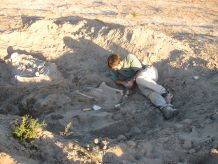Alejandro Serna
Marie Skłodowska-Curie Experienced Researcher
Visit Alejandro Serna's profile on the York Research Database to:
- See a full list of publications
- Browse activities and projects
- Explore connections, collaborators, related work and more
Profile
Biography
Alejandro is an Argentinian Archaeologist specialized in Patagonian hunter-gatherers and is mainly interested in human interaction networks, paleodiet, and mobility.
He obtained his degree (Licenciado) in Anthropology in 2012 at the Universidad Nacional de La Plata (Argentina), where he would pursue his postgraduate studies focused on Patagonian archaeology. His PhD (CONICET, Argentina, 2014-2018), focused on the potential ethnic identification of North Patagonian hunter-gatherers through morphological and isotopic evidence. During those years, he received isotope-related (δ18O, 87Sr/86Sr, δ13C, and δ15N) laboratory and analytical hands-on training at the University of Cape Town (South Africa, 2016), the University of Utah (USA, 2017), and the University of Ottawa (2018).
After his PhD, Alejandro became a Postdoctoral Fellow at the Universidad Nacional de La Plata (CONICET, Argentina, 2018-2020); where he conducted paleomobility research in Patagonia using strontium isotopes and spatial modeling. In 2021, he joined the University of Utah (USA) as a Postdoctoral Research Associate to collaborate with the forensic project FIND-EM which seeks to identify the potential provenance of human remains through oxygen isotope isoscapes.
Alejandro became part of BioArCh in May 2022 as a Marie Skłodowska-Curie Experienced Researcher to carry out the project "POUR - Pottery use from the earliest records of Patagonia through biomolecular analysis", under the supervision of Professor Oliver Craig.
Research
Overview
Alejandro has dedicated almost his entire career to studying Late Holocene hunter-gatherer human remains from Patagonia to address different research questions. After having integrated geometric morphometric analysis of cranial modifications, biological distances through dental metrics, and oxygen stable isotopes on human remains and water to address Patagonian ethnicity during his PhD (Universidad Nacional de La Plata); he would focus his research on the application of molecular analysis to evaluate paleomobility. During his first postdoctoral position (Universidad Nacional de La Plata in collaboration with the University of Ottawa), he worked with strontium isotopes and applied machine-learning algorithms to develop a high-resolution isoscape for North Patagonia. His second postdoctoral position allowed him to collaborate on the FIND-EM project (University of Utah), which seeks to narrow down the region of origin of military personnel using oxygen isotopes and spatial modeling across the contiguous USA.
Still excited about the capabilities of molecular archaeology, Alejandro will carry out the MSCA project POUR to address the uses of some of the earliest Patagonian pottery through biomolecular and stable isotope analyses.
Projects
POUR - Pottery use from the earliest records of Patagonia through biomolecular analysis (MSCA)
The EU-funded Marie Skłodowska-Curie project POUR will undertake the first systematic research on the uses of early pottery among Patagonian foragers who adopted and spread this technology in a challenging environment without engaging in intensive production.
Since its introduction in East Asia during the Late Pleistocene more than 15 thousand years ago, ceramic technology has become almost universal. Theories that linked this technological breakthrough to the development of farming and sedentary lifestyles are currently being revisited. New data from the Northern Hemisphere suggest pottery would have been a hunter-gatherer innovation widespread by the processing of aquatic resources during sporadic episodes. By combining cutting-edge biomolecular (GCMS, GC-c-IRMS) and isotopic (EA-IRMS) analyses on pottery and organic residues and the most accurate data interpretation methods (e.g. Bayesian mixing models), POUR will explore if the Southern Hemisphere Patagonia region experienced a similar social and technological trajectory.


